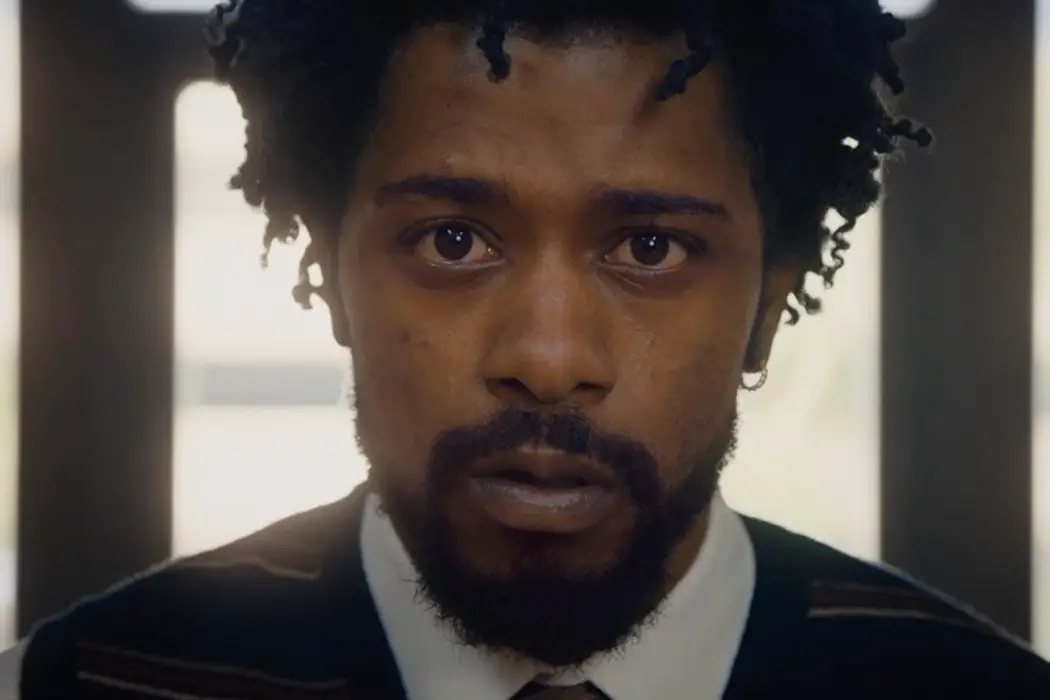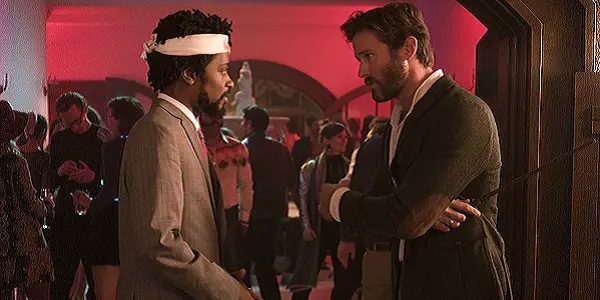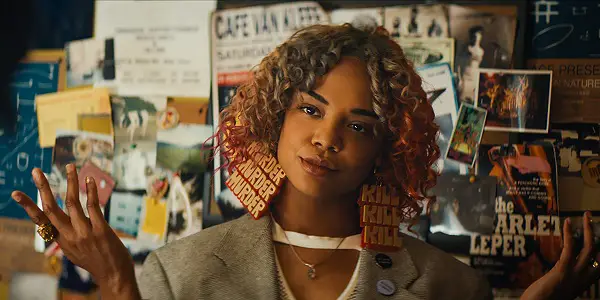SORRY TO BOTHER YOU: A Surreal Social Satire That’s Perfect For Right Now

Lee Jutton has directed short films starring a killer toaster,…
As the primary vocalist for Oakland-based hip-hop group The Coup, Boots Riley has spent his musical career targeting racial inequality, police brutality, capitalism, imperialism, and other sources of American oppression through witty lyrics and catchy beats. Now, the artist and activist has turned his considerable talents to the medium of film, much to our benefit.
Sorry to Bother You, a companion piece to The Coup’s 2012 concept album of the same name, is a wickedly funny and unabashedly weird science-fiction story set in the world of telemarketing. Imagine if the searing modern satire of Black Mirror was more outrageously funny and blatantly pro-union and you have a pretty good idea of what to expect from Sorry to Bother You – and yet you’ll still be shocked at the twists and turns the story takes. It is a bold statement of intent from an artist who has devoted his career to speaking out on behalf of the oppressed in society.
Started From the Bottom…
Cassius Green (Lakeith Stanfield), also known as Cash – no, Riley’s not one for subtlety – is struggling to make ends meet in Oakland. He lives in his uncle’s garage and still can’t stay on top of his rent, while his up-and-coming artist girlfriend, Detroit (Tessa Thompson), has to earn money as a sign-twirler outside of stores. When Cash snags a job interview at a telemarketing firm called RegalView, he is so desperate to secure even this most unglamorous of gigs that he shows up armed with a fake Employee of the Month plaque and a greatly embellished resume.

Cash gets the job at RegalView, but he struggles to make his first sale until an old-timer (Danny Glover) advises him to try using his white voice. It’s a voice that is carefree and oozes unconscious privilege, a voice that doesn’t need to worry about where the next dollar is coming from. Basically, the old timer tells Cash, it is how white people wish they sounded, and it makes them feel better to hear it coming from you.
Turns out, Cash’s white voice sounds exactly like David Cross, and it’s a winner. Soon, Cash finds himself closing sale after sale, climbing the ranks at RegalView until he reaches that elite threshold known as Power Caller status – all on the strength of his white voice. But as Cash continues to climb the corporate ladder, the other telemarketers at RegalView are much less content. One disgruntled colleague, Squeeze (Steven Yeun), decides to organize a work stoppage; the RegalView telemarketers will strike until they’re allowed to form a union and improve the terms of their employment.

Despite his earlier enthusiasm for the strike, Cash finds himself unwilling to stop working just as he’s about to finally achieve the elite status he has always aspired to but assumed was out of reach. Said status is symbolized by an exclusive gold elevator that the Power Callers take to ascend to their special floor – yet another example of Riley’s tendency to go as big and bombastic on the metaphor as possible.
Not only is Cash struggling with the moral quandary over whether he should betray his colleagues for the sake of personal success, but he learns that, as a Power Caller, he is expected to sell work contracts on behalf of Worryfree, a shady company that promises a literal lifetime of worry-free employment and housing for you and your loved ones. Worryfree is run by an eccentric Elon Musk type named Steve Lift (Armie Hammer), who claims that Worryfree workers are totally content to be farmed out to a variety of industries for cheap labor. Yes, it’s basically modern slavery, and Cash, as a black American, has to decide whether he is comfortable selling his fellow humans over the phone just to fuel his meteoric rise to the top to the heap.
Go Big or Go Home
Riley masterfully uses magical realism techniques to bring the bizarre world of Sorry to Bother You to life. In one particularly effective bit of visual whimsy, whenever Cash calls a potential customer at RegalView, his tiny cubicle immediately smashes through the ceiling of the customer’s home. There, he must sit face to face with them while attempting to sell them encyclopedias or other useless paraphernalia, all while “sticking to the script.” It’s visually compelling and perfectly conveys the immense sense of awkwardness that comes from attempting to get something out of a stranger on the phone.

Said awkwardness is all the more hilariously appealing because it is personified by Lakeith Stanfield, whose jittery charisma and crackling comic timing should make him an even bigger star. His energy on screen is infectious and keeps you engaged in the film even when it starts to fly off the rails into orbit. (Listening to David Cross’s voice coming out of his mouth is impossibly jarring, but then again, that’s the point.)
Stanfield is surrounded by a strong supporting cast, with Thompson, Yeun, and a far from Call Me By Your Name Hammer as particular standouts. Riley’s fearless storytelling style needed a fearless cast in order to succeed, but he definitely met his match in this group. They tackle every curveball the script throws at them with admirable aplomb. And let me tell you, there are a lot of curveballs, some of which land far better than others.
There are several instances in which Sorry to Bother You screams “first feature.” That’s not necessarily a bad thing; it’s a mark of a fresh talent bursting onto the scene, and we need more filmmakers like that, especially those who have as much to say as Riley. But sometimes the statements he is trying to make are too quickly pushed out of the way by another crazy plot point making yet another statement. The story of Sorry to Bother You encapsulates everything wrong with modern society – no small feat, to be sure – but the audience is barely given time to absorb the impact of what Riley is saying before being hit over the head with something new.

That isn’t to say that Sorry to Bother You is not enjoyable or important; it is both, a rare feat for a film straddling so many different genres. It is the perfect film for this particular moment – a moment that feels defined by the struggles of the ordinary people against traditional structures of power – even if it isn’t a perfect film. And with so many sequels and reboots populating cinemas this summer, a film as wildly imaginative as Riley’s should be seen and celebrated.
Conclusion: Sorry To Bother You
Sorry to Bother You is a crazy, colorful reminder that while the ruling class makes it almost impossible to get ahead without crushing others underfoot, we do have the power – not to mention the moral imperative – to stand up and say no, it doesn’t have to be this way.
Not every wild storytelling gamble works and some of the metaphor comes across as heavy-handed as a Trump-Macron handshake. Nonetheless, Riley deserves immense plaudits for taking such risks and making such a powerful statement in his feature film debut.
What do you think? Does Sorry to Bother You sound like a timely satire or a film that is trying too hard to say too much? Share your thoughts in the comments below.
Sorry to Bother You was released in the U.S. on July 6, 2018. You can find more international release dates here.
Does content like this matter to you?
Become a Member and support film journalism. Unlock access to all of Film Inquiry`s great articles. Join a community of like-minded readers who are passionate about cinema - get access to our private members Network, give back to independent filmmakers, and more.
Lee Jutton has directed short films starring a killer toaster, a killer Christmas tree, and a not-killer leopard. Her writing has appeared in publications such as Film School Rejects, Bitch: A Feminist Response to Pop Culture, Bitch Flicks, TV Fanatic, and Just Press Play. When not watching, making, or writing about films, she can usually be found on Twitter obsessing over soccer, BTS, and her cat.













